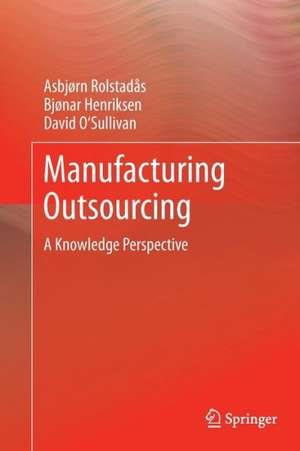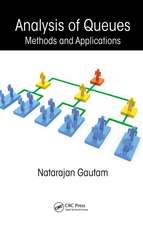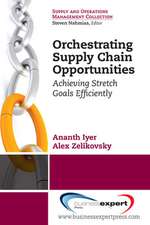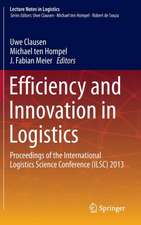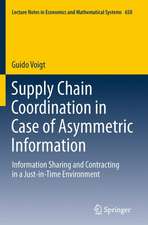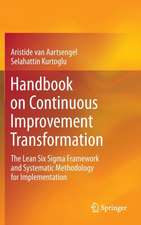Manufacturing Outsourcing: A Knowledge Perspective
Autor Asbjørn Rolstadås, Bjonar Henriksen, David O'Sullivanen Limba Engleză Paperback – 8 mai 2014
Outsourcing in Manufacturing: the Knowledge Dimension gives examples of the key decisions that needs to be taken by managers regarding effective outsourcing. Decisions are divided around the structural and infrastructural aspects of outsourcing and the key knowledge that needs to be managed to support good decisions. The book contains illustrations and examples of key processes throughout and concludes with a section dedicated to case studies. These case studies represent a variety of manufacturing system types and sizes focused on supply chain integration, and which deploy various manufacturing paradigms including craft, mass, lean, adaptive, and sustainable manufacturing.
Outsourcing in Manufacturing: the Knowledge Dimension covers many theoretical and practical examples of critical outsourcing decisions, their knowledge aspects and how knowledge challenges can be dealt with in a systematic way. It provides a key resource for students, lecturers and industry managers looking to solidify their understanding and application of outsourcing decision making strategies.
.
| Toate formatele și edițiile | Preț | Express |
|---|---|---|
| Paperback (1) | 638.11 lei 6-8 săpt. | |
| SPRINGER LONDON – 8 mai 2014 | 638.11 lei 6-8 săpt. | |
| Hardback (1) | 642.51 lei 6-8 săpt. | |
| SPRINGER LONDON – 28 apr 2012 | 642.51 lei 6-8 săpt. |
Preț: 638.11 lei
Preț vechi: 750.72 lei
-15% Nou
Puncte Express: 957
Preț estimativ în valută:
122.12€ • 127.02$ • 100.82£
122.12€ • 127.02$ • 100.82£
Carte tipărită la comandă
Livrare economică 14-28 aprilie
Preluare comenzi: 021 569.72.76
Specificații
ISBN-13: 9781447161080
ISBN-10: 1447161084
Pagini: 248
Ilustrații: XVI, 232 p.
Dimensiuni: 155 x 235 x 13 mm
Greutate: 0.35 kg
Ediția:2012
Editura: SPRINGER LONDON
Colecția Springer
Locul publicării:London, United Kingdom
ISBN-10: 1447161084
Pagini: 248
Ilustrații: XVI, 232 p.
Dimensiuni: 155 x 235 x 13 mm
Greutate: 0.35 kg
Ediția:2012
Editura: SPRINGER LONDON
Colecția Springer
Locul publicării:London, United Kingdom
Public țintă
ResearchCuprins
Part 1.Trends in Manufacturing.- 1.Taking control of the company’s destiny through knowledge.- 2. Drivers for change in manufacturing.- 3. Manufacturing in a strategic context.- 4. Evolving paradigms in manufacturing.- 5. The knowledge dimension.- Part 2. 6.Industrial outlook.- 7. Indicators and initiatives for industrial renewal.- 8. Research roadmaps in manufacturing.- 9. How well are we doing?.- Part.3 Outsourcing –strategic opportunities.- 10. Manufacturing strategies, created through decisions.- 11. Make or buy?.- 12. The geographical footprint.- 13.Approaching the partner selection and location decision.- 14. Dealing with complexity – infrastructure decisions .- Part 4. Innovation and knowledge transfer.- 15.The innovation process.- 16. What is knowledge?.- 17. Knowledge creation.- 18. Knowledge transfer and distance.- 19. Knowledge transfer and manufacturing.- 20. Outsourcing and sustainability.
Notă biografică
Asbjørn Rolstadås has had a long career in research production management. He has more than 250 publications and is the author of several books. He is a former president of the Norwegian Academy of Technological Sciences, and also President of IFIP (International Federation for Information Processing). He is a member of the editorial boards of many research journals, and he is the founding editor of the International Journal of Production Planning and Control. He has been project manager for several large EU projects and for a large number of national research projects. He has close links with industry through consulting and continuing education.
Bjørnar Henriksen has written a number of articles on manufacturing strategy and knowledge, and has a PhD degree within these fields. He is a senior research scientist at SINTEF, Norway and has broad experience in consultancy (Ernst & Young and Cap Gemini) and applied research (SINTEF and The Norwegian University of Science and Technology, NTNU). He has worked with multinational companies and SMEs in different industries facing different strategic challenges. He is currently project manager for two large R&D projects funded by the Norwegian government aiming to innovate in small scale manufacturing with a particular focus on knowledge creation.
David O’Sullivan is the author of a number of books on manufacturing including his recent book ‘Applying Innovation’ with Sage Publications in California. He has published over 100 research articles from a number of research projects with industry in the fields of manufacturing strategy and innovation management. David has worked with many multinational companies including Hewlett Packard, Ingersoll-Rand and IBM. He lectures at the National University of Ireland where he also leads a research team in the field of knowledge management applications that support innovation in industry.
Bjørnar Henriksen has written a number of articles on manufacturing strategy and knowledge, and has a PhD degree within these fields. He is a senior research scientist at SINTEF, Norway and has broad experience in consultancy (Ernst & Young and Cap Gemini) and applied research (SINTEF and The Norwegian University of Science and Technology, NTNU). He has worked with multinational companies and SMEs in different industries facing different strategic challenges. He is currently project manager for two large R&D projects funded by the Norwegian government aiming to innovate in small scale manufacturing with a particular focus on knowledge creation.
David O’Sullivan is the author of a number of books on manufacturing including his recent book ‘Applying Innovation’ with Sage Publications in California. He has published over 100 research articles from a number of research projects with industry in the fields of manufacturing strategy and innovation management. David has worked with many multinational companies including Hewlett Packard, Ingersoll-Rand and IBM. He lectures at the National University of Ireland where he also leads a research team in the field of knowledge management applications that support innovation in industry.
Textul de pe ultima copertă
All companies which reach a critical size are faced with outsourcing decisions that can increase the value of their products and services primarily through lower costs, greater reliability and improved efficiency. Successful outsourcing decisions have an important knowledge dimension, where the outsourcing professionals need to be supported by historical and contextual knowledge regarding their own products performance but also the performance of suppliers. Outsourcing in Manufacturing: the Knowledge Dimension explains in detail how a manager can acquire, create, transfer and use knowledge that optimizes their outsourcing decisions and improves the changes of marketplace success.
Outsourcing in Manufacturing: the Knowledge Dimension gives examples of the key decisions that needs to be taken by managers regarding effective outsourcing. Decisions are divided around the structural and infrastructural aspects of outsourcing and the key knowledge that needs to be managed to support good decisions. The book contains illustrations and examples of key processes throughout and concludes with a section dedicated to case studies. These case studies represent a variety of manufacturing system types and sizes focused on supply chain integration, and which deploy various manufacturing paradigms including craft, mass, lean, adaptive, and sustainable manufacturing.
Outsourcing in Manufacturing: the Knowledge Dimension covers many theoretical and practical examples of critical outsourcing decisions, their knowledge aspects and how knowledge challenges can be dealt with in a systematic way. It provides a key resource for students, lecturers and industry managers looking to solidify their understanding and application of outsourcing decision making strategies.
Outsourcing in Manufacturing: the Knowledge Dimension gives examples of the key decisions that needs to be taken by managers regarding effective outsourcing. Decisions are divided around the structural and infrastructural aspects of outsourcing and the key knowledge that needs to be managed to support good decisions. The book contains illustrations and examples of key processes throughout and concludes with a section dedicated to case studies. These case studies represent a variety of manufacturing system types and sizes focused on supply chain integration, and which deploy various manufacturing paradigms including craft, mass, lean, adaptive, and sustainable manufacturing.
Outsourcing in Manufacturing: the Knowledge Dimension covers many theoretical and practical examples of critical outsourcing decisions, their knowledge aspects and how knowledge challenges can be dealt with in a systematic way. It provides a key resource for students, lecturers and industry managers looking to solidify their understanding and application of outsourcing decision making strategies.
Caracteristici
Uses case studies and illustrations to give examples of critical decisions and the knowledge aspects of these decisions Provides theory and practical examples of critical outsourcing decisions and how knowledge challenges could be dealt with in a systematic way Written by experts with both academic and practical experience in manufacturing outsourcing Includes supplementary material: sn.pub/extras
